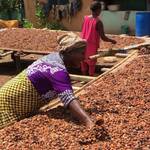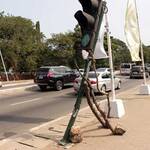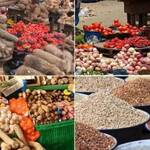Ivory Coast has raised the fixed farmgate price paid to cocoa farmers to 1,000 CFA francs ($1.62) per kilogramme (kg) for the main crop of the 2023/24 season, up from 900 CFA francs/kg last season.
The cocoa producer price increase in Ivory Cost amounts to $1,610 per tonne lower than the $1,821 Ghana has offered farmers.
It means that Ghanaian farmers are receiving $211 more for a tonne of cocoa than their counterparts in Ivory Coast.
The agriculture minister Kobenan Kouassi Adjoumani, also announced the farmgate price for coffee which was raised 20% to 900 CFA francs per kg.
Ivory Coast, the world’s top cocoa producer, is expecting about a 20% drop in cocoa production this season due to poor weather conditions.
Ghana’s producer price is 70.5% of the Gross Free on Board (FoB) price, and is equivalent to $1,821 per tonne.
It is the highest price to be paid to cocoa farmers across West Africa in some 50 years.
COCOBOD receives only the FoB price which is cost of the cocoa beans only.
This is because, insurance and freight are received by the insurance companies and shipping lines respectively.
Forward sales
In addition, it is important to note that Ghana’s cocoa beans are mostly sold forward.
This means that the 2023/24 crop was sold between October 2022 and June 2023 at international prices ranging between $2,060 per tonne and $ 2,800 per tonne.
The international price of cocoa then began to increase in April 2023, when a greater percentage of the 2023/24 crop had been sold already.
Guaranteed producer price to cocoa farmers
The forward sale strategy enables COCOBOD to give farmers a guaranteed producer price and raise the syndicated loan offshore to pay farmers promptly for their produce.
Change in Producer Price determination mechanism
The Producer Price determination mechanism has changed from Net FoB to Gross FoB.
The difference is that with the use of net FoB, the amount farmers are paid is arrived at after all industry costs had been deducted.
With this method, farmers receive less of the total proceeds from the sale.
However, with the change in the mechanism to gross FoB, the amount that farmers are paid is determined first before all other industry costs.
This method ensures that farmers get more from the sale of the beans
It is feared that price gap between Ghana and Ivory Coast will lead to smuggling into Ivory Coast this 2023/2024 cocoa season as Ivorian farmers are expected to take advantage of higher prices in Ghana.
People have been illegally transporting, or smuggling, cocoa beans between Ivory Coast and neighboring Ghana for many years.
As long as buyers in Ghana will pay more for Ivory Coast cocoa, the smuggling is likely to continue.
Cocoa smuggling between Ghana and Ivory Coast is quite common, with its direction shifting back and forth depending on the price difference between the two countries.
Economic woes have hurt farmers, who say basic operational costs, including the price of farm inputs such as fertiliser, chemicals have risen sharply some as high as 300%.
Under Ghanaian law, farmers are only allowed to sell their beans to purchasing clerks who act as intermediaries between them and Ghana Cocoa Board (COCOBOD).
$400 Living Income Differential
Ivory Coast and Ghana teamed up and agreed to sell cocoa with a living income premium of $400 a tonne added to the price, in a bid to reform the way global cocoa is priced.
Forward sale of 80% of cocoa beans
Ghana and Ivory Coast, which account for about 60% of global cocoa output, typically sell about 80% of the main harvest before the beginning of every season, a system which allows it to lock in prices and set the minimum pay for farmers.
Two-cycle cocoa season in Ghana
The country operates a two-cycle cocoa season, consisting of the main crop, which is mainly exported to Europe at a premium, and a light crop harvest, which is discounted by around 20% to local grinders.
Ghana, Ivory Coast get only $5.75bn out of $100bn chocolate market
While the two countries contributed to more than 60% of the world’s cocoa output, their total earning from the sale of cocoa beans amounted to a paltry $5.75 billion whereas the chocolate market was worth some $100 billion in that same year.
Ghana, Ivory Coast produce 60% of world’s cocoa
It means that the farmers whose toil and sweat produced 60% plus of the world’s cocoa earned 5.75% of the global value of their activity.




